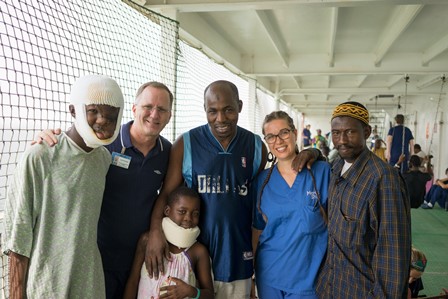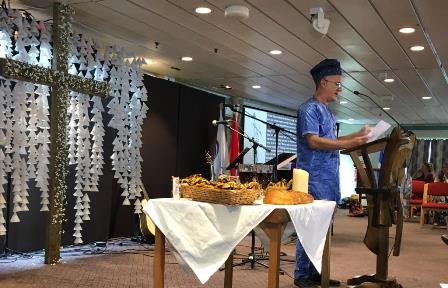How do people refer to you? A question to consider. For me here and my service with Mercy Ships
in Africa, I have various responses. For
many, I am one of their fellow crewmembers on board the Africa Mercy. With some
crew, patients and day crew, they will refer to me as ‘oncle’ or ‘tonton’ –
both mean uncle, papa, ‘grand-père’ – in English grandpa and ‘grand frère’
which is ‘big or older brother’ in English.
I am ok with all of them, though it took a little while to accept the ‘grandpa’
title, but I know it is used out of love and respect. Some have explained that if they refer to me
as ‘oncle’ then their children will automatically refer to me as ‘grand-père’. While visiting my friends who are patients
and caregivers at the HOPE Center, I asked them the same question and I
received all these responses.
Many of you who know me, remember that I often will accept a local name in each
country and that I even list them on my web site in ‘My Profile’: Local African Names: Kofi (male child born on
Friday) in Ghana; Kofa in Liberia; Sahr
(first born son in the Kono tribe) Keith in Sierra Leone; Keita
in Guinea; Lahimatoa (first born son) in Madagascar, and sometimes Robert in
the French speaking nations. Here in
Guinea, I will often hold my finger over the ‘h’ in my given name on my ID
badge and say in French: “Je m’appelle Keita.” It is a Malinke/Mandingo tribe name and I
have almost instant connection particularly with those from that people group –
though I share with them that the only word I know in their language is the
word for Thank you – clearly, I haven’t done my homework in studying their
language.
After a ten month field service, there are many goodbyes and farewells – though
the memories I take with me are of those (patients, caregivers, day crew,
participants, and partners) I got to know during the ten months and became
friends. An exhortation I have been
pondering shared by some invited guests who have lived and served in West
Africa many years: ‘when the time comes that you leave, make sure that they know you love
them and will still be thinking of them.”
Holy Week on board one of the Mercy Ships is a special time with meaningful opportunities available for the crew to participant in. Some include: Sundays of Lent, daily devotionals from the book by Trent Sheppard called ‘Jesus Journey’, Palm Sunday, Maundy Thursday with a foot washing stations, garden of gethsemane, Seder Passover, Good Friday Tenebrae service and then sunrise service on Sunday morning up on the upper deck eight, a morning service of celebration – I was able to share the reading from the Gospel of John in chapter 20.


I will close this update with a sad story – I learned on Friday that one of the patients that I knew well from our time here in Guinea in 2013 died – from a fall from a mango tree, not malaria as originally thought. His name was Mafugie and he came from a nearby country – The Gambia, as he needed pediatric orthopedic surgery. A woman named Mary who had known the boys for a couple years referred him to us. Due to needing orthopedic surgery and the time it takes for casts and therapy, he was with us for a long time and many came to love this little guy. He had an amazing smile and I gave him the nickname of ‘Miboy’. I can still remember being with him and his mama on their last day in 2013. With many of the patients, I get to know you do not really know what happens when they return home. However, that is changing more now that those in the city have access to Facebook, WhatsApp and Messenger. Mary would often annually have someone from her organization make the long journey to his village and would share with me the cell phone photos that were available.
Prayer Requests:
* Complete healing and recovery for all
of our surgical patients so that they can be discharged by the end of May when
we close our wards
* Health and safety for all of our crew
coming and going and our local workers – day crew – who are so important to
what is taking place here.
* For our medical capacity building
training participants to capture the learning and those who have been trained
to be trainers to share with others what they have learned and have a lasting
impact in the nation of Guinea.
* Our preparations for the next field
service in Senegal and after that in Liberia.
